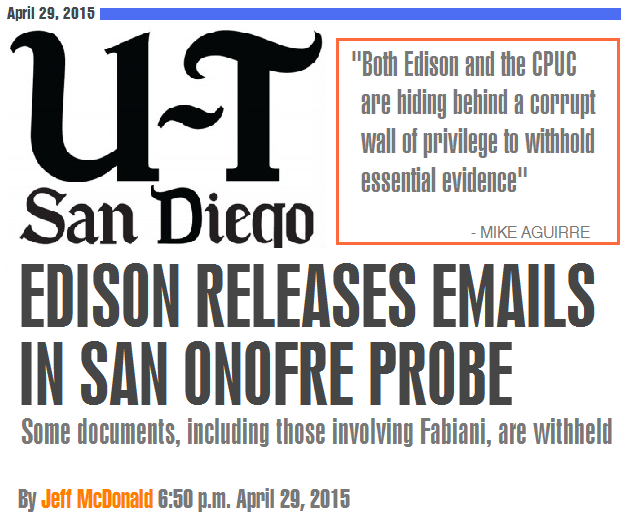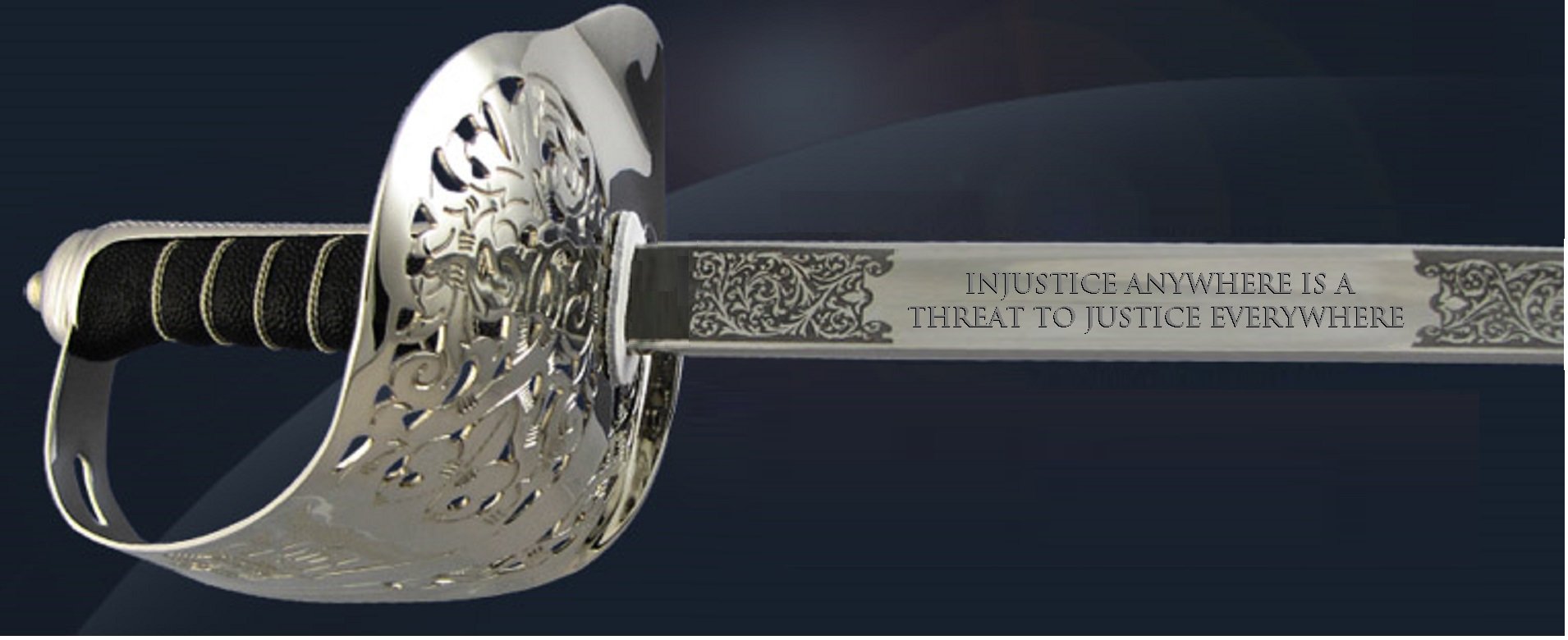Southern California Edison: A Corrupt Wall Of Evidence

Read Jeff McDonald’s original story as it appeared in the U~T San Diego.
Read the documents released by Edison.
Edison Releases Emails In San Onofre Probe
Some Documents, Including Those Involving Fabiani, Are Withheld
By Jeff McDonald 6:50 p.m.April 29, 2015
Southern California Edison responded Wednesday to an order from state utility regulators that the company hand over all of its communications about settling the costs of the premature shutdown of the San Onofre nuclear power plant.
The majority owner of the failed plant provided the California Public Utilities Commission with 34 emails and other documents pertaining to the agreement, which charged ratepayers 70 percent of the $4.7 billion in expenses.
Edison said it went through more than 2 million records and identified fewer than 100 responsive documents. It cited legal privileges in withholding more than 50 other exchanges identified by its lawyers after the commission ordered the release of documents two weeks ago.
Regulators sought the documents as part of their review of possible sanctions against Edison for its two-years-late disclosure of a secret meeting in Warsaw, where one of its executives discussed a framework for settlement with former commission President Michael Peevey.
The Edison response says utility officials did nothing wrong and emphasized that any private discussions with Peevey or other regulators were “one-way” conversations.
“SCE did not negotiate a settlement with President Peevey or any other CPUC decision-maker,” the utility said. The “Warsaw meeting was not a negotiation.”
The utility also provided statements from key executives and a “privilege log,” which listed various records its attorneys said were exempt from release for reasons such as attorney-client confidentiality rules.
Some of the records Edison declined to release include confidential drafts, cost-recovery notes and at least six documents from early April 2013 that contain the word “settlement” in the subject matter listing, according to the log. The Warsaw meeting occurred in March 2013.
Edison also withheld numerous communications between its executives, company attorneys and Peevey, even though including a third party in communications between lawyers and their clients might be expected to render the attorney-client privilege legally moot.
High-profile attorney Mark Fabiani, who has represented the San Diego Chargers in the team’s push for a new publicly funded stadium for more than a decade, also appears in the list of emails and documents withheld by Edison.
Fabiani sent a “proposed action plan” to two top Edison officials on May 28, 2014 – after the proposed San Onofre settlement was released but before it was approved. The document was withheld under the attorney-client privilege and as confidential work product.
Fabiani’s expertise is crisis communications, and his involvement came within days after former San Diego City Attorney Mike Aguirre grilled Peevey at a commission hearing about whether he had secret meetings with Edison.
In a now famous outburst, Peevey replied, “I’m not here to answer your goddamned questions. Now shut up – shut up!”
It was not until January of this year that the secret meeting at a luxury hotel in Warsaw became publicly known, after U-T San Diego reported that notes of the meeting were seized by criminal investigators in a raid at Peevey’s house.
Aguirre, who has sued the commission and Edison to overturn the settlement, said the records withheld by the utility appear more incriminating than the ones made public.
“This is the tip of an evidentiary iceberg of a $5 billion fraud,” he said. “The most important piece of evidence produced is the evidence of what was not produced. Both Edison and the CPUC are hiding behind a corrupt wall of privilege to withhold essential evidence.”
Aguirre said he would amend one of his ongoing lawsuits to try to force Edison and the commission to release more records.
The commission is spending up to $5.2 million for top white-collar criminal defense attorneys, who have so far been primarily concerned with reviewing documents as investigators and others raise questions about backchannel dealings and possible favoritism by regulators.
Edison did release a memorandum that former vice president Stephen Pickett wrote to his bosses April 1, 2013, just days after his meeting in Poland to discuss the outfall from the San Onofre Nuclear Generating Station.
The memo is titled “Elements of a SONGS Deal” and lays out specific deal points Pickett said he culled together from his recollection of the conversation he had with Peevey at the Hotel Bristol in Poland, where the two men were attending an industry-funded study tour.
Edison insisted Peevey did almost all of the talking, while Pickett jotted down Peevey’s thoughts on hotel stationery that became known as the “RSG notes” – short for replacement steam generators, the failed equipment that caused San Onofre breakdown in January 2012.
The company said it never saw the RSG notes until they were released by the Attorney General’s office earlier this month. Pickett was not authorized to negotiate on behalf of Edison, the utility also noted several times.
“Stephen Pickett, who was then an SCE executive, was taken by surprise when President Peevey began speaking in Warsaw about a framework for a possible resolution,” Edison said in its filing.
The documents withheld by the utility indicate that Commissioner Michel Florio was involved in several discussions with Edison executives in the days leading up to the evidentiary hearing during which Peevey had his outburst. Florio said at the meeting that he had not engaged in any improper communications with Edison in advance of the hearing.
Some of the released emails show internal discussions between Edison officials about how to respond to developments related to the June 2013 announcement that the plant would be closed for good.
Before the announcement, Edison CEO Ted Craver advised his top aides about conversations he had with Peevey, Gov. Jerry Brown and Sen. Dianne Feinstein.
“He said what we were doing seemed right under the circumstances, good to reduce uncertainty, and took a little swipe at (U.S. Nuclear Regulatory Commission) bungling the process which was going to cause harm to CA,” Craver quoted Gov. Brown as saying. “I indicated that if he was so moved, it would help if he could indicate we had talked and that he thought the company was acting responsibly and focused on the right things. He indicated a willingness to do that.”
Craver said Feinstein was “incredibly warm, understanding and supportive” during his 15-minute conversation.
In another private note to colleagues, Edison executive Michael Hoover recounted a conversation he had with Florio’s chief of staff that same week about moving quickly to recover the company’s investment in San Onofre.
“We discussed how to do that in a manner that is inclusive of the parties and avoids the type of animosity toward the CPUC that has plagued the PG&E San Bruno proceeding,” he wrote, referring to Pacific Gas & Electric’s 2010 pipeline blast that killed eight people.
The utilities commission did not respond on Wednesday to questions about whether the release by Edison is fully compliant with the April 14 order or whether it will insist on release of documents withheld by the company.
The order from commission judges Melanie Darling and Kevin Dudney ordered Edison to “produce all documents pertaining to oral and written communications about potential settlement of the SONGS (investigation) between any SCE employee and CPUC” between March 2013 and November 2014.
© Copyright 2015 The San Diego Union-Tribune, LLC. An MLIM LLC Company. All rights reserved.

